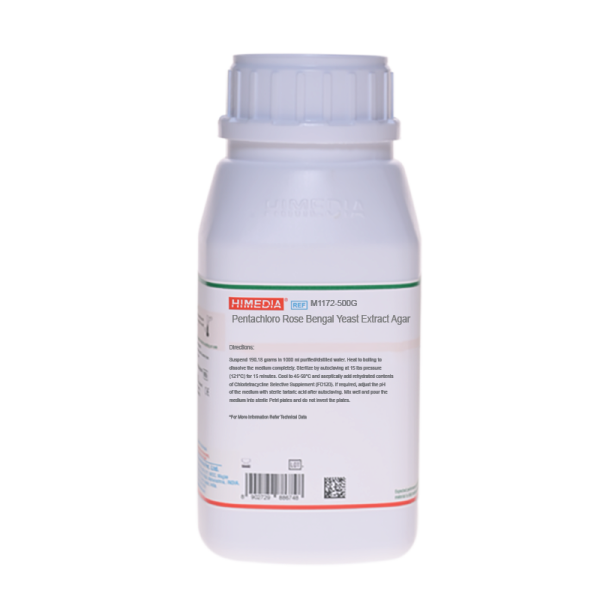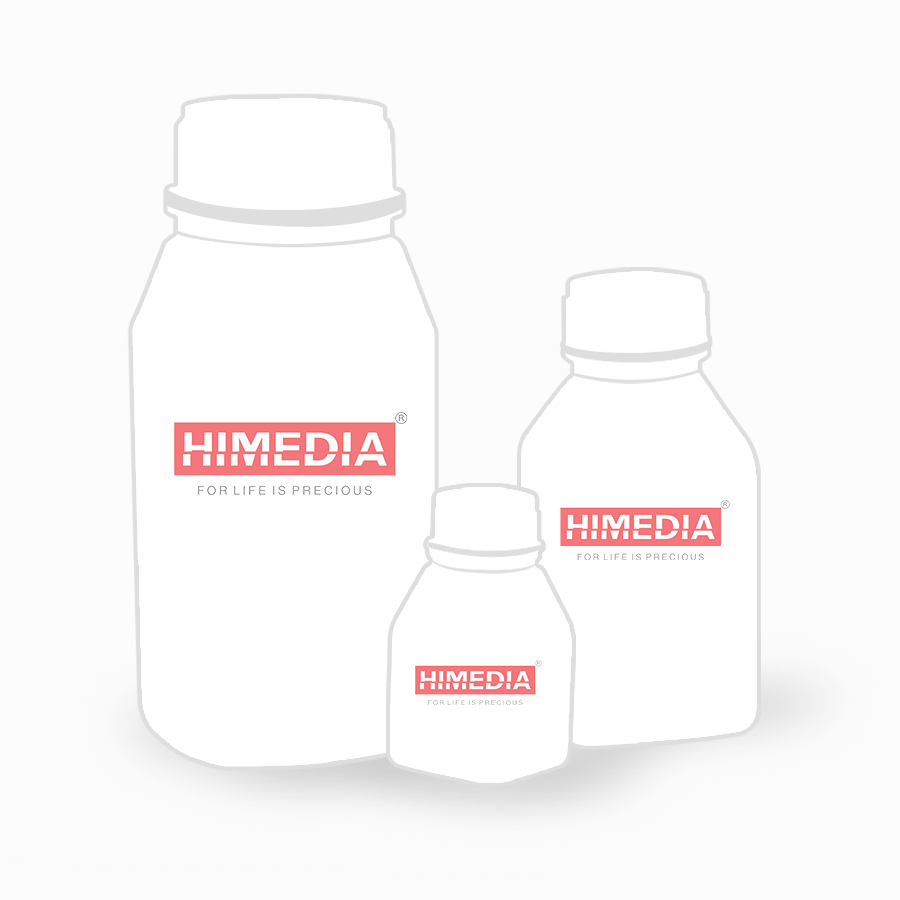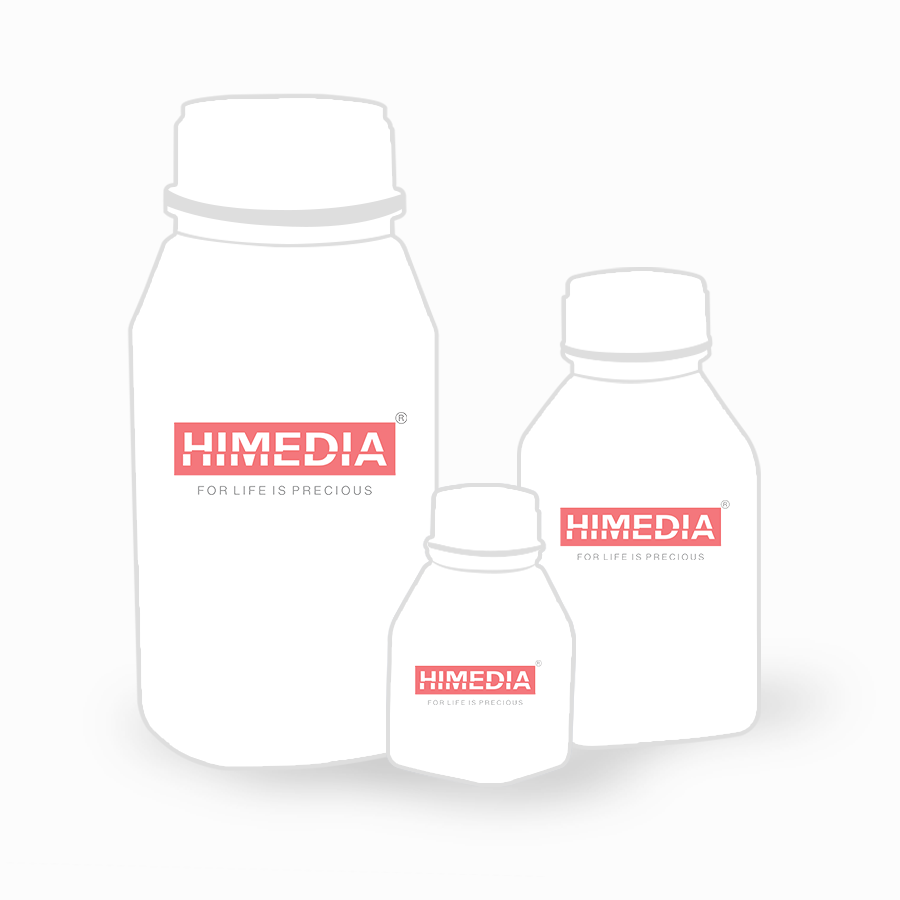 Your enquiry has been submitted
Your enquiry has been submitted
Pentachloro Rose Bengal Yeast Extract Agar Base (PRYES Agar)
Intended Use
Pentachloro Rose Bengal Yeast Extract Agar (PRYES Agar) is recommended for the cultivation and differentiation of nephrotoxin producing strains of Penicillium viridicatum and related species isolated from foods in accordance with APHA.
Composition
| Ingredients | Gms/Litre |
|---|---|
| Sucrose | 150.000 |
| Yeast extract | 20.000 |
| Pentachloronitrobenzene | 0.100 |
| Rose Bengal | 0.025 |
| Chloramphenicol | 0.050 |
| Agar | 20.000 |
Final pH (at 25°C): 5.6±0.2
Formula adjusted, standardized to suit performance parameters
Directions
Suspend 190.18 grams in 1000 ml distilled water. Heat to boiling to dissolve the medium completely. Sterilize by autoclaving at 15 lbs pressure (121°C) for 15 minutes. Cool to 45-50°C and aseptically add rehydrated contents of 1 vial of Chlortetracycline Selective Supplement (FD120). If required, adjust the pH of the medium with sterile tartaric acid after autoclaving. Mix well and pour the medium into sterile Petri plates and do not invert the plates.
Principle And Interpretation
Mycotoxins are metabolites of fungi which may be produced during mould growth on foods and animal feeds. The most seriously contaminated commodities are cereals and oil seeds (1).
Several mycotoxins in agricultural products cause health hazards to people and animals and also economical problem. Mycotoxins are stable and are not degraded by digestion. Crops contaminated by mycotoxins due to fungal growth if ingested by animals will cause the toxin to enter the food chain. Mycotoxins vary greatly in their severity ranging from some allergic response to lethal effects.
PRYES medium was formulated by Frisvad (2) for the cultivation and differentiation of mycotoxin or nephrotoxin producing strains of Penicillium viridicatum and related species (3). It is also recommended by APHA (4) for the same purpose.
The medium consists of yeast extract, sucrose (YES) as the basal medium and pentachloronitrobenzene and rose bengal and hence the name PRYES. The medium is also supplemented with chloramphenicol and chlortetracycline. This combination is more effective in inhibiting bacteria than chloramphenicol alone. This medium distinguishes between producers of ochratoxin A and citrinin and producers of xanthomegnin and viomellein. Ochratoxin and citrinin-producing Penicillium viridicatum strains form a violet brown pigment seen on the reverse side of colony. Xanthomegnin and viomellein-producing Penicillium viridicatum and Penicillium cyclopium produce a yellow pigment seen on the reverse side of the colony.
Quality Control
Appearance: Light yellow to pink homogeneous free flowing powder
Gelling: Firm, comparable with 2.0% Agar gel.
Colour and Clarity of prepared medium: Pink coloured clear to slightly opalescent gel forms in Petri plates
Reaction: Reaction of 19% w/v aqueous solution at 25°C. pH : 5.6±0.2
Cultural Response
pH: 5.40-5.80
M1172: Cultural characteristics observed with added Chlortetracycline Selective Supplement (FD120), after an incubation at 25-30°C for 48-72 hours.
| Organism | Growth |
|---|---|
| Penicillium viridicatum ATCC 10515 | luxuriant |
| Staphylococcus aureus ATCC 25923 | inhibited |
| Escherichia coli ATCC 25922 | inhibited |
Storage and Shelf Life
Store between 15-25°C in tightly closed container and prepared medium at 2-8°C. Use before expiry date on the label.
Reference
- Collins C. H., Lyne P. M., Grange J. M., 1995, Collins and Lynes Microbiological Methods, 7th Ed., Butterworth Heinemann.
- Frisvad J. C., 1981, Appl. Environ. Microbiol., 41: 568.
- Frisvad J. C., 1983, J. Appl. Bacteriol., 54: 409.
- Vanderzant C. and Splittstoesser D. F., (Eds.), 1992, Compendium of Methods for the Microbiological Examination of Foods, 3rd Ed., APHA, Washington, D.C.
| Product Name | Pentachloro Rose Bengal Yeast Extract Agar Base (PRYES Agar) |
|---|---|
| SKU | M1172 |
| Product Type | Regular |
| Physical Form | Powder |
| Origin | Animal Free (Microbial) |
| Packaging type | HDPE |
| References | 1. Collins C. H., Lyne P. M., Grange J. M., 1995, Collins and Lynes Microbiological Methods, 7th Ed., Butterworth Heinemann. |
| Customized Product Available | No |





